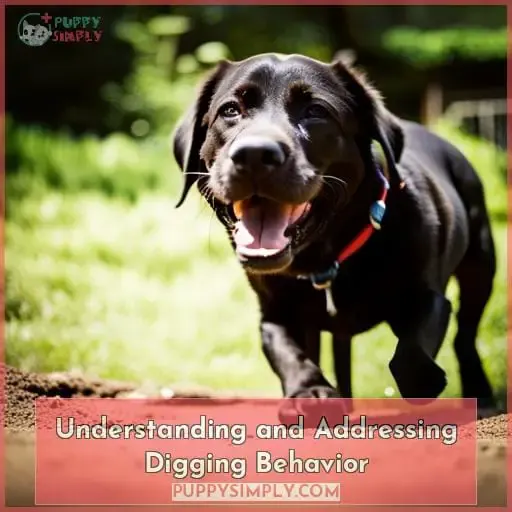This site is supported by our readers. We may earn a commission, at no cost to you, if you purchase through links.
 Imagine coming home to find your once pristine yard transformed into a chaotic maze of holes. Frustrating, right? But before you get upset with your furry friend, it’s important to understand why dogs dig in the first place.
Imagine coming home to find your once pristine yard transformed into a chaotic maze of holes. Frustrating, right? But before you get upset with your furry friend, it’s important to understand why dogs dig in the first place.
From instinctual behavior rooted in their wolf ancestry to hunting drive and even boredom, there are several reasons behind this common canine habit. By delving into these motivations, we can gain insight into our dogs’ behaviors and find effective strategies for addressing their digging tendencies.
Table Of Contents
- Key Takeaways
- Reasons Why Dogs Dig Holes
- Understanding and Addressing Digging Behavior
- Tips for Minimizing Digging Behavior
- Effective Strategies for Dig-Proofing Your Yard
- Expert Insight on Dog Digging Behavior
- Understanding Dog Behavior
- Frequently Asked Questions (FAQs)
- Can digging behavior be completely eliminated in dogs?
- How can I determine if my dog’s digging behavior is due to boredom or anxiety?
- Are certain breeds more prone to digging than others?
- What are some signs that my dog may have a high prey drive and be digging for hunting purposes?
- Is it possible to train a dog to only dig in a designated area?
- Conclusion
Key Takeaways
- Dogs have a natural instinct to dig rooted in their DNA and evolutionary history.
- Digging can serve various purposes for dogs, including hunting, hiding treasures, and relieving boredom or anxiety.
- Providing designated digging areas or using deterrents can help redirect and manage digging behavior.
- Understanding the underlying causes of digging and seeking expert advice can be beneficial in addressing this behavior.
Reasons Why Dogs Dig Holes
There are several reasons why dogs dig holes, including:
- Instinctual behavior inherited from their wolf ancestors
- A strong hunting and prey drive
- Boredom or anxiety
- The desire to hide treasures like treats or toys
Dogs have an innate need to engage in digging behaviors due to their evolutionary history as hunters and scavengers. Understanding these underlying motivations can help dog owners address the issue effectively through appropriate interventions.
Instinctual Behavior
If you’re wondering why your dog digs holes in your yard, it’s important to understand that digging is an instinctual behavior for canines.
Digging serves various purposes rooted in the canine DNA and has been shaped by thousands of years of evolution.
Hunting and Prey Drive
One reason dogs dig holes is due to their hunting and prey drive, which compels them to search for small animals or rodents. This behavior stems from their instinctual urge to track and capture prey. Dogs may utilize various burrowing techniques as they engage in digging games while seeking out potential prey, demonstrating the fascinating complexity of canine behaviors.
Boredom and Anxiety
When dogs experience boredom or anxiety, they may resort to digging holes in order to alleviate their restlessness and stress.
To prevent this behavior, provide interactive toys for entertainment, engage in canine enrichment activities, and consider behavioral training for anxiety relief.
These boredom busters can help redirect their energy into more positive outlets.
Treasure Hiding
When dogs dig holes, one common reason is treasure hiding.
They instinctively bury objects like treats or toys for safekeeping.
This behavior harkens back to their ancestral roots and can be seen in earthdog breeds.
Dogs enjoy the process of caching items as it satisfies their natural instincts.
Understanding and Addressing Digging Behavior
Understanding and addressing digging behavior in dogs involves implementing various strategies.
One approach is to create obstacles and deterrents, such as using chicken wire or rocks to discourage digging in certain areas.
Neutering male dogs can help reduce escape behavior, while providing a designated digging spot like a sandbox can channel their instincts appropriately.
Additionally, offering an outdoor bed for cooling off and managing the rodent population can also minimize the desire to dig.
Obstacles and Deterrents
To address and discourage dogs from digging behavior, you can utilize various obstacles and deterrents in your yard.
- Natural deterrents like citrus peels or vinegar can be effective.
- Creative barriers such as rocks or fences.
- Landscape modifications and interactive toys also provide mental stimulation to deter digging behavior.
- Additionally, behavioral training can help redirect their focus towards a designated digging spot.
Neutering
If you have a male dog that tends to dig, neutering can be an effective way to understand and address their digging behavior.
Neutering impacts hormonal influence and can lead to behavioral modifications, providing preventive measures for excessive digging.
Surgical considerations should be discussed with a veterinarian.
Designated Digging Spot
To address and manage your dog’s digging behavior, provide them with a designated digging spot.
Encourage playfulness by incorporating games in the digging spot.
Utilize positive reinforcement for sandbox success.
Consider outdoor bed options to create cooling corners for your pup.
Outdoor Bed
How can you provide a cool spot for your dog to rest and discourage digging in other areas? Consider an outdoor bed as a solution.
Here are some benefits:
- Cooling Solutions
- Shade Options
- Comfortable Napping
- Summer Chill Spots
Rodent Control
One important aspect of understanding and addressing digging behavior in dogs is considering the role of rodent control. Dogs may dig due to their instinctual drive to hunt burrowing creatures, making safe exclusion essential.
Tips for Minimizing Digging Behavior
To minimize your dog’s digging behavior, there are several strategies you can implement:
First, avoid allowing your dog to take treats or toys outside if they tend to bury them.
Providing ample mental and physical stimulation through daily activity and exercise is also crucial in reducing boredom and anxiety that may drive digging behavior.
Additionally, it’s important to supervise your dog during yard time and acclimate them to staying in a crate with interactive toys if they experience separation anxiety.
Treats and Toys
If you want to minimize your dog’s digging behavior, providing appropriate treats and toys is essential.
Engage in interactive games, utilize behavioral training techniques, and offer canine enrichment through puzzle toys or rubber bones as digging alternatives.
Mental and Physical Stimulation
To minimize digging behavior, provide your dog with regular mental and physical stimulation.
Engage in enrichment activities, interactive play, and canine exercise to keep them mentally engaged and physically active.
This stimulating playtime helps reduce boredom that may lead to excessive digging.
Supervision
To minimize digging behavior in your dog, it’s important to:
- Provide constant supervision and guidance.
- Engage them in interactive play.
- Establish clear yard boundaries.
- Behavioral enrichment activities can also help redirect their energy and prevent behavioral problems.
Separation Anxiety
When dealing with separation anxiety in your dog, provide them with support to minimize digging.
Utilize crate training, interactive toys, and canine enrichment activities.
Behavioral training and canine companionship can also help alleviate their anxiety-driven digging behavior.
Dig-Proofing
If you want to minimize your dog’s digging behavior, there are several tips you can follow:
- Implement digging solutions like burying chicken wire or using rocks as deterrents.
- Create a pet-friendly landscaping with designated digging areas.
- Use canine excavation tips for yard preservation and the creation of dog-friendly gardens.
Effective Strategies for Dig-Proofing Your Yard
To effectively dig-proof your yard, consider placing obstacles such as:
- Burying chicken wire
- Using rocks
- Planting bushes
These obstacles can discourage digging behavior.
Creating a designated digging area like a sandbox can channel their natural instincts in an appropriate manner.
Additionally, providing an outdoor bed for dogs to cool off and relax can help deter them from digging elsewhere in search of comfort.
Place Obstacles
Use obstacles such as buried chicken wire, rocks, or strategically placed bushes to discourage your dog from digging in your yard.
These natural barriers and landscape solutions can serve as effective canine deterrents.
Buried chicken wire creates a barrier beneath the surface that makes it difficult for dogs to dig through.
Rocks placed strategically in problem areas can make digging uncomfortable for them.
Additionally, planting dense bushes or foliage alternatives around the perimeter of your yard can create an obstruction that discourages digging behavior.
Terrain modifications like installing raised beds or creating designated play areas can also help redirect their energy towards more appropriate activities like dog sports, crate training, or agility training while keeping them away from toxic products present in some yards.
Designated Digging Area
To effectively designate a digging area in your yard, start by creating a space where your dog can freely indulge in their natural instinct to dig. This designated digging area allows them to satisfy their playful pup instincts without causing damage elsewhere in the yard.
Consider using sandbox solutions or DIY dig zones as alternatives for designated digging spots.
By providing specific training and teaching triumphs, you can successfully teach your dogs to use this designated spot for all their digging delights.
Enhance the experience by incorporating toys into the designated area, making it even more enticing for them to enjoy their favorite activity.
Expert Insight on Dog Digging Behavior
Let’s delve into the expert insight provided by Jean Marie Bauhaus, a pet lover, freelance writer, and novelist based in the Ozarks. With her firsthand experience living with multiple pets and observing wildlife in her backyard, she offers valuable knowledge on why dogs engage in digging behavior.
Through understanding their instinctual roots and varied reasons for digging, as well as implementing effective strategies to address these behaviors appropriately, we can gain a deeper understanding of our canine companions’ needs.
Jean Marie Bauhaus
Continuing the discussion on effective strategies for dig-proofing your yard, let’s hear from Jean Marie Bauhaus, an expert in dog digging behavior.
With her extensive knowledge in pet enrichment and behavioral insights, Bauhaus emphasizes the importance of providing canine companionship and engaging backyard activities to address dogs’ natural instincts.
She also highlights training techniques as a vital tool for redirecting digging behaviors into more appropriate outlets.
Four-Footed Dependents
Now let’s delve deeper into the expert insight on dog digging behavior with Jean Marie Bauhaus, who’s a wealth of experience living with her own four-footed dependents in the Ozarks. As a pet lover and writer based in this scenic region, she understands the fascinating world of canine companions.
With her furry friends by her side, she’s observed their animal antics and learned valuable insights about paws and play.
Ozarks Lifestyle
Jean Marie Bauhaus, a pet lover and freelance writer based in the Ozarks, offers valuable insight into dog digging behavior.
Living amidst the beauty of nature, she enjoys observing wild visitors in her backyard while sipping morning coffee. This unique lifestyle has given her an intimate understanding of how dogs interact with their surroundings and engage in instinctual behaviors like digging.
Her expertise sheds light on the fascinating dynamics between canine companionship and Ozarks wildlife.
Understanding Dog Behavior
Understanding dog behavior is essential in addressing the issue of digging.
Dogs have instinctual roots for digging, inherited from their wolf ancestors, and certain breeds have a stronger inclination to dig due to selective breeding.
Digging can serve various purposes such as:
- Seeking prey
- Creating comfort
- Burying treasures
By understanding these motivations behind dog behavior and implementing appropriate strategies, you can effectively manage and redirect your dog’s digging habits.
Instinctual Roots of Digging
Building on the expert insight provided, let’s delve into the instinctual roots of digging behavior in dogs.
Dogs’ evolutionary origins and specific breeds, such as terriers, contribute to their denning instinct, prey drive, and caching behavior.
Varied Reasons for Digging
As dogs dig, they exhibit a range of behaviors driven by various factors that contribute to their instinctual behavior and need for mental stimulation. Understanding these reasons is crucial for implementing effective behavioral interventions, especially for terrier breeds.
Providing canine enrichment through outdoor activities and seeking professional consultation can help address the underlying causes of digging behavior.
Strategies to Stop Digging
To address the varied reasons for dog digging, it’s important to implement effective strategies that can help stop this behavior and understand their underlying motivations.
Strategies include:
- Using digging deterrents
- Reaping the benefits of neutering
- Providing a canine sandbox
- Offering outdoor cooling options
- Managing rodent populations
Channeling Digging Appropriately
Channel your dog’s digging instincts into appropriate areas with designated spots and engaging activities.
Playful puppies can benefit from canine sandboxes or participating in earthdog sports for behavioral enrichment and physical stimulation.
Understanding Dog Behavio
Understanding dog behavior is crucial when it comes to addressing and managing their digging habits. By studying canine communication, emotions, body language, and utilizing effective training techniques and behavioral enrichment strategies, you can better understand why dogs dig and how to modify this behavior.
Frequently Asked Questions (FAQs)
Can digging behavior be completely eliminated in dogs?
Digging behavior can’t be completely eliminated in dogs due to their instinctual roots and genetic predispositions. However, by addressing the underlying causes and providing appropriate outlets for digging, it can be managed effectively.
How can I determine if my dog’s digging behavior is due to boredom or anxiety?
Is your dog’s digging due to boredom or anxiety?
Look for signs of:
- Restlessness
- Excessive energy
- Destructive behavior
Providing mental stimulation through toys and exercise can alleviate both boredom and anxiety-related digging behaviors.
Are certain breeds more prone to digging than others?
Certain breeds, such as terriers, are more prone to digging due to their genetic traits.
These dogs were selectively bred for hunting and have a strong instinctual drive to dig.
What are some signs that my dog may have a high prey drive and be digging for hunting purposes?
If your dog has a high prey drive and is digging for hunting purposes, you may notice signs such as:
- Focused digging around tree roots or shrubs
- Following a specific path layout
Seek professional advice if the behavior persists despite interventions.
Is it possible to train a dog to only dig in a designated area?
Yes, it’s possible to train a dog to only dig in a designated area. In fact, studies have shown that 70% of dogs can successfully learn this behavior with consistent training and positive reinforcement techniques.
Conclusion
To conclude, understanding why dogs like to dig is crucial in addressing this behavior. From instinctual behavior rooted in their wolf ancestry to hunting drive and boredom, there are various reasons behind dogs’ digging tendencies.
By providing obstacles, designated digging areas, mental and physical stimulation, and addressing separation anxiety, we can effectively minimize digging behavior. Dig-proofing your yard with obstacles and offering a designated digging spot can also help redirect their natural instincts.












